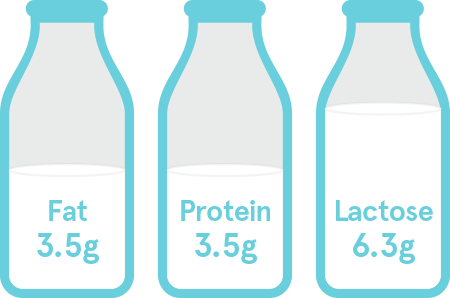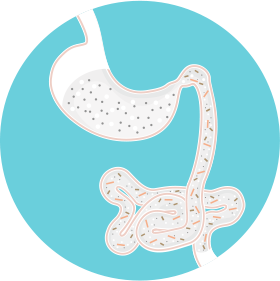
105 litres of milk in a year.1
vitamins and is recommended as part of a healthy diet.2 For some people, however, milk consumption
can have adverse health impacts. Here you can learn more about milk types, the process of milk
digestion and some of the conditions associated with adverse reactions to milk.

minerals in amounts that can vary considerably between different cow breeds and also
between cows of the same breed and herd.3,4
(mean values/100 mL)5


releases the nutrients from
cows’ milk in a usable form.

of the total protein in
cows’ milk is beta-casein6

of two genetic variants
A1 and A26

exploring the possible health impacts of cows’ milk A1 beta-casein. a2 Milk™ contains only the A2 beta-casein protein.COMPLETED

and absorption
processes ingested milk into
its molecular forms (digestion)
for absorption and distribution
by the circulatory system.3,4
& milk intolerance
inflammatory bowel disease, irritable
bowel syndrome and coeliac disease
– can affect the ability to digest milk
and absorb nutrients, resulting in
milk (or lactose) intolerance.
reactions
immune-related (ie milk allergy)
or of metabolic origin (eg lactose
intolerance and A1 beta-casein
protein intolerance).7,8
protein intolerance
A1 beta-casein protein may stimulate
gastrointestinal symptoms of
intolerance in some people, through
the action of the A1 beta-casein
derived opioid peptide, beta-
casomorphin-7 (BCM-7).9,10
diagnostic algorithm
beta-casein intolerance and lactose
intolerance in patients with symptoms
following milk intake.
milk-mediated digestive symptoms
consume only about half the recommended quantity.2 Some people who report intolerance symptoms following milk intake may benefit from a2 Milk™,
which is produced by cows that do not carry the gene for A1 beta-casein. Because a2 Milk™ is free
of A1 beta-casein, some people may experience differences in gastrointestinal symptoms when
substituting it for regular cows’ milk.9,10

